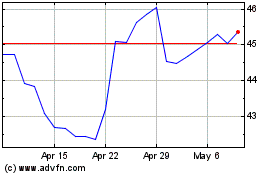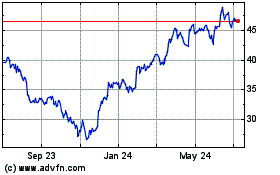General Motors' Opel Sale Faces Political Resistance Ahead of Key Europe Elections
February 15 2017 - 9:36AM
Dow Jones News
By William Boston in Berlin and Nick Kostov in Paris
The chief executives of General Motors Co. and Peugeot moved
quickly on Wednesday to head off political resistance emerging in
Germany to the potential sale of GM's struggling Opel unit to its
French rival.
Both companies said on Tuesday they were in talks that could
lead to the sale of GM's European business to Peugeot. It quickly
became clear, however, that political opposition to job cuts in a
year of hotly contested elections in Germany and France would be
one of the biggest obstacles to any deal.
GM's chief executive Mary Barra and the company's president, Dan
Ammann, flew to Germany overnight to meet Opel's management and
senior labor representatives at Opel's headquarters in Rüsselsheim.
The meeting appears to be the first extensive discussion about the
sale that Ms. Barra has held with senior management at Opel.
In Paris, Peugeot chief executive Carlos Tavares, credited with
a swift three-year turnaround of the French car maker, reached out
to German Chancellor Angela Merkel to try to win her backing for
the deal.
Ms. Merkel's spokesman told reporters that the government hadn't
yet received a request from Mr. Tavares, but stressed that the
government would play an active role in any sale of Opel.
"Opel is an innovative company with a long history in Germany,"
said Steffen Seibert, Ms. Merkel's spokesman. Considering "the
consequences for jobs at many locations in Germany, it's clear that
we, the government of the Federal Republic, will be involved," he
said.
The Opel sale opens old wounds for Ms. Merkel. In 2009, she
fought hard with GM to ensure that GM's planned sale of Opel to
Magna International Inc. of Canada wouldn't lead to massive job
cuts at the German factories. Two months after signing the deal, GM
changed its mind, and pulled out of the sale in a bid to rebuild
its European business.
GM's new turnaround comes as Ms. Merkel faces a tough reelection
bid. Her liberal immigration policies have boosted a
antiestablishment party, --Alternative for Germany--which is
gaining in the polls. And, for the first time in years, a resurgent
Social Democratic party leads Ms. Merkel's conservatives in the
polls. The two parties share power in Ms. Merkel's coalition
government.
Surprised by GM's renewed change of heart, Ms. Merkel's cabinet
held "intense discussions" about the sale and Opel's future at its
weekly meeting on Wednesday, said Andrea Nahles, a Social Democrat,
and labor minister.
"Our highest priority is securing the three Opel factories in
Germany," Ms. Nahles told reporters after the cabinet meeting.
Opel is one of Germany's oldest car makers. The company began
making sewing machines in 1862 and began making cars in 1899. GM
bought the struggling company in the midst of the financial crisis
of 1929.
Today, Opel and its British Vauxhall unit operate 10 factories
in Europe. The company employs 38,000 people, 19,000 of them in
Germany.
Brigitte Zypries, Germany's economics minister, said it was
"completely unacceptable" that GM and Peugeot carried out
negotiations about the sale of Opel without any involvement from
trade unions or the company's workforce, which under German law has
extensive rights to influence management decisions.
"We will study a potential sale of Opel/Vauxhall to (Peugeot)
without reservations based on our previous experience with
Peugeot," Ms. Zypries said.
Members of Ms. Merkel's Christian Democrats also cited job
security for Opel's German workforce as their priority. Volker
Bouffier, prime minister of Hesse state, where Opel is based, said
it didn't matter who owned Opel, adding: "What matters is what
happens here."
While fear of job losses could be expected to spark protests, it
is less clear whether Germany has the power to block a deal. In the
2009 sale, in the wake of the financial crisis, the German
government provided subsidies to ease the costs of restructuring.
That gave Berlin a voice in the negotiations.
George Calliers, an analyst with Evercore ISI, said Peugeot may
not plan big job cuts, at least not at first. He said Mr. Tavares
can achieve large savings by combining research and development
costs and other capital expenses, allowing him to avoid raising the
specter of job cuts in an election year.
"Restructuring is probably a longer-term story," said Mr.
Calliers.
Zeke Turner in Berlin contributed to this article.
Write to William Boston at william.boston@wsj.com and Nick
Kostov at Nick.Kostov@wsj.com
(END) Dow Jones Newswires
February 15, 2017 09:21 ET (14:21 GMT)
Copyright (c) 2017 Dow Jones & Company, Inc.
General Motors (NYSE:GM)
Historical Stock Chart
From Mar 2024 to Apr 2024

General Motors (NYSE:GM)
Historical Stock Chart
From Apr 2023 to Apr 2024
